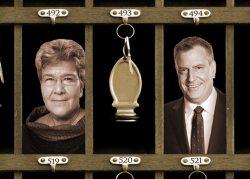Hotel workers are supporting a measure that could reduce the number of hotels in the city.
That sounds contrary to their interests, but the opposite is true, because the bill targets nonunionized hotels.
The New York Hotel and Gaming Trades Council backs a measure that calls for every certificate of occupancy issued for a class B hotel to allow for residential use as well. However, it won’t cost any of the union’s members their jobs: The bill all but ensures the hotels where they work will not be converted into housing.
Under the measure, the owner of any hotel with unionized workers must receive written approval from the employees’ collective bargaining representative to move forward with a conversion. So, union reps would have the power to block conversions, while workers in nonunion hotels would continue to have no say.
Rich Maroko, president of the hotel workers union, has said the bill would turn hotels that are bad for the city into something useful.
“Failing hotels provide only poverty-level jobs, bring crime to local communities, and tarnish the reputation of New York City’s tourism industry,” Maroko said in a statement.
Supporters of nonunion hotels say they played a key role in the extraordinary growth of tourism that New York City enjoyed from the 1990s until the pandemic.
Read more


A union source said the measure does not prevent conversion of unionized hotels outright, but ensures that their workers will not suddenly find themselves out of a job.
The bill is the latest example of the Hotel Trades Council promoting policies that would reduce competition from nonunion hotels.
The hotel workers union similarly supported legislation that restricts the development of new hotels in the city. With its passage last year, developers must now obtain a special permit to build a hotel in the city, a requirement that gives the hotel union leverage to block such projects.
The City Council casts the deciding vote for special permits, and the Hotel Trades Council is active in Council elections. It could pressure Council members to make a hotel’s approval conditional on the owner’s not opposing a union organizing drive. Hotel developers are suing to overturn the law.
Maroko’s comments on conversions echo the union’s testimony in support of the special permit requirement, which emphasized the need to curb hotel development in an oversaturated market and to promote higher-quality hotel accommodations.
The latest bill, which is sponsored by Sen. Brain Kavanagh and Assembly member Steven Cymbrowitz, would allow hotel owners to avoid costly land use mandates and renovations. It also has the support of Mayor Eric Adams, who enjoys the union’s political support.
Last year the legislature approved the Housing Our Neighbors with Dignity Act, which authorized the state to finance the purchase and conversion of hotels and offices on behalf of state-approved nonprofits.
The measure requires that at least 50 percent of converted units be set aside for residents who experienced homelessness immediately before moving in. Overall, the properties must be dedicated to residents making an average of 50 percent and no more than 80 percent of the area median income.
The state budget last year included $100 million for conversions under HONDA, but the money remains unspent, as conversions have so far been impractical. Still, the legislature included another $100 million for the program in the latest budget and expanded the law so that conversions can take place outside of NYC.
Conversions under Kavanagh’s bill must either be funded through HONDA or be otherwise financed or acquired by a local housing agency and managed by a nonprofit. The apartments must be rent-stabilized and dedicated to low-income residents or those who were recently homeless, and tenants cannot pay more than 30 percent of their income on rent.
Such provisions make conversions economically challenging and dependent on subsidies.
Kavanagh introduced the bill last year, and a version of it was in Gov. Kathy Hochul’s budget proposal. Since last year, a few tweaks have been made to it. At least part of the hotel must be within 400 feet of a district that allows residential use, down from 800 feet in a previous version. Hotels located within industrial business zones are also not eligible for conversion.
